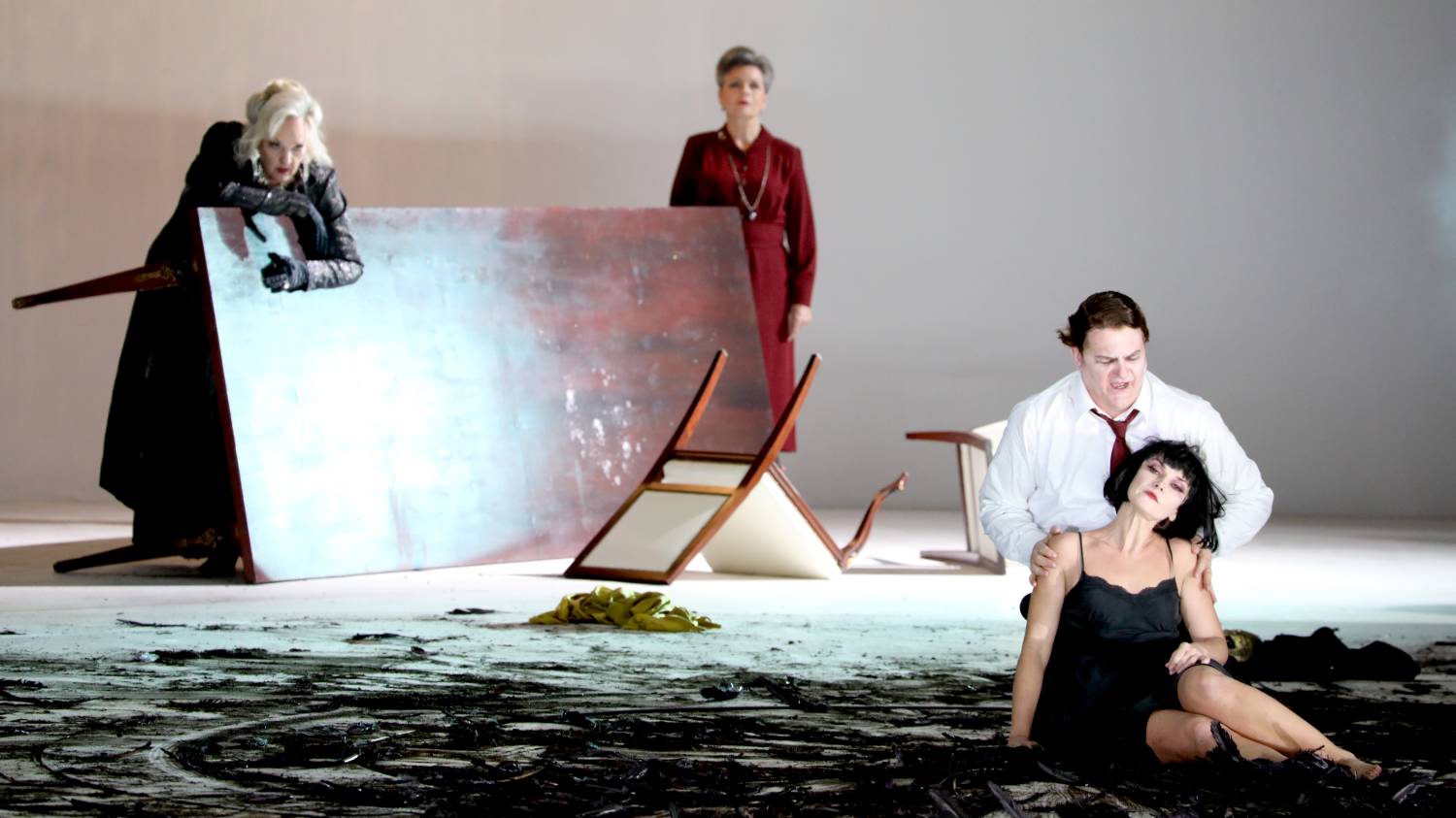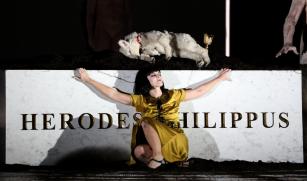The operatic 2023 of the Teatro alla Scala opens in the name of the twentieth century repertoire and of Richard Straussan author fortunately often proposed in the last seasons of Piermarini (until, however, some less popular Straussian titles such as, for example, Whim or Arabelle?). The famous one-act play of 1905 is staged Salome, based on a libretto by the German writer, poet and translator Hedwig Lachmann from the homonymous play by Oscar Wilde, written in French in 1891, during a stay in Paris and, a few years later, also published in English translation. “Among the other very lively daughters of the prolific Wildian bad girl, then, we obviously cannot pass in silence the extraordinary work by Richard Strauss which transforms the little princess into a post-Wagnerian Isolt […] among dizzying vocalisms”: this is how Alberto Arbasino’s sharp, lucid pen defined the Straussian composition, a musical concentrate lasting about one hundred minutes in which eroticism, spirituality, suicides, necrophilic kisses, love and death intertwine.
He made his debut at the Teatro alla Scala Axel Koberat home in Bayreuth, music director of the Deutsche Oper am Rhein since 2009, renowned interpreter of the German repertoire (Wagner primarily). With iron technique, the maestro native of Kronach opts for a compact and granitic reading, solid and free of smudges, obtaining from the Orchestra of the Teatro alla Scala a full-bodied, robust sound with a marble consistency. A solid, monolithic and steely direction, free from languors, transparencies and delicate nuances, pervaded by an essential and controlled sensuality, never languid, even in the “Tanz der sieben Schleier”, tackled with an energetic attitude.
For the first time on these boards he sings Vida Miknevičiūtė, acclaimed as Salome, in recent years, in Vienna, Helsinki, St. Petersburg and Melbourne. A real stage animal, with a remarkable dramatic temper, the Lithuanian soprano exhibits a voice that runs easily in the large theater hall, soaring and pointed in the lightning high notes, well supported in the medium and low notes, mottled with seductive metallic veins. With a graceful, charming physique and accurate diction, the artist identifies himself with the character, sparing himself for nothing and totally adhering to the radical directorial interpretation. The German baritone is already known to the Verona public Michael Volle who, in the coming seasons, will play Wotan in the new Ring directed by Christian Thielemann. Monumental and hieratic stage presence, possessing a torrential and voluminous vocality, homogeneous in all ranges and of dark texture, Volle is a thunderous and austere Jochanaan, carved in stone in the phrasing, who hurls his prophecies and curses with vigor and penetrance.
He is well placed in the role of a neurotic, irascible and fearful Herodes Wolfgang Ablinger-Sperrhacke, with a ductile and weighty tenor vocal instrument, with a harsh and mercurial timbre, lively and witty in speaking. American soprano Linda Watson he paints with credibility a magnetic, uninhibited, inhuman and deliberately tacky Herodias, with an expansive and authoritative voice, solemn in bearing. On the shields the proof of the German tenor Sebastian Kohlheppa tormented Narraboth and borderline, distinguished by his ringing and soft vocality, with silvery and shiny metal; the mezzo-soprano Lioba Braun he is a vocally centered and velvety Page of Herodias. The large group of supporting actors was effective, among which we mention, at least, the two sonorous Soldiers of the Ukrainian Alexander Milev and of German Bastian Thomas Kohlthe musicals Jiří Rajniš And Sung Hwan Damien Park like Nazarenes, the bright one Hyun-Seo David Park (A slave).
The show is that, signed by the (now ex) child terrible Damiano Michieletto and of his teamfilmed by Rai cameras without an audience in the hall and broadcast, on delayed television, in February 2021, followed by us in person and which, for the occasion, we had already described in more detail (here the link); however, the direction shows some revisions and differences compared to 2021. Michieletto’s is a symbolic, introspective and psychoanalytic, almost Freudian key to reading, played on clear contrasts and immersed in the contemporary world. In his interpretation of what he sees as a cruel family tragedy, the closeness between the protagonist and Hamlet is fundamental: both, in fact, are orphans of a father, murdered by their uncle and mother, so that they can get married. Again according to Michieletto, parallels can be found between Salome and Elektra, both deprived of the father figure and eager for revenge and redemption. During the performance, we witness a marked evolution of the character of Salome, from a provocative and capricious Lolita, gradually aware of the abuses suffered by her uncle-stepfather and of his crimes, to a rebellious and feral creature, who digs up the skull of her father Herod Philip, takes off the black bob wig remaining almost bald and, smeared with earth and blood, kisses his father’s skull. The final coup de theater is very effective, with the protagonist who, advancing towards the back of the stage to reach the double-child, finds death in the cistern of the Baptist, where Herod Philip had also been imprisoned in her time. The lacquered, neutral and timeless scenes of Paul Fantin they show a room/mausoleum with white walls, dominated by an oppressive black sphere with a reflective surface, a sort of eye of the unconscious, symbol of the evil and restless moon. The beautiful costumes of Carla Teti, with a mention for the two worn by the protagonist (an elegant and sober green-yellow dress and a black petticoat); she vivid the lights of Alessandro Carletti, played on bright colors with an expressionist flavour; impactful and brutal the choreography of Thomas Wilhelmtaken from Erika Rombaldoni, for the awaited “Dance of the Seven Veils”, in which we witness the rapes perpetrated in the past by Herodes against Salome. As often happens with the shows of the Venetian director and his team, on the stage, populated by athletic and mysterious angels of death with black wings, and elements such as raven feathers and earth, aesthetically pregnant images follow one another (for example Jochanaan and the tomb of Herod Philip who sink into the cistern wrapped in a ring of fire) and others that are sometimes crude and violent (Salome’s macabre monologue, although the iconography of the protagonist who, stripped of everything, remains almost hairless, brings to mind the finale of another production by Michieletto, Alcinaproposed in Salzburg in 2019 and in Florence last autumn).
Sold out theater and, at the end, a thunderous success for all the performers and for those in charge of the visual part, with nine minutes of festive applause and ovations especially for Vida Miknevičiūtė, Axel Kober, Michael Volle, Linda Watson and Sebastian Kohlhepp. 




Teatro alla Scala – Opera and Ballet Season 2022/23
SALOME
Drama in one act from the homonymous poem by Oscar Wilde
in the German translation of Hedwig Lachmann
Music by Richard Strauss
herodes Wolfgang Ablinger-Sperrhacke
Herodias Linda Watson
Salome Vida Miknevičiūtė
Jochanaan Michael Volle
Narraboth Sebastian Kohlhepp
Ein Page der Herodias Lioba Braun
Funf Juden Matthäus Schmidlechner, Matthias Stier,
Patrick Vogel, Patrick Reiter, Horst Lamnek
Zwei Nazarener Jiří Rajniš, Sung Hwan Damien Park
Zwei Soldaten Alexander Milev, Bastian Thomas Kohl
Ein Kappadozier Matías Moncada
Ein Sklave Hyun-Seo David Park
Orchestra of the Teatro alla Scala
Director Axel Kober
Direction Damiano Michieletto
Scenes Paul Fantin
Costumes Carla Teti
Lights Alessandro Carletti
Choreography Thomas Wilhelm taken from Erika Rombaldoni
Teatro alla Scala production
Milan, 14 January 2023







